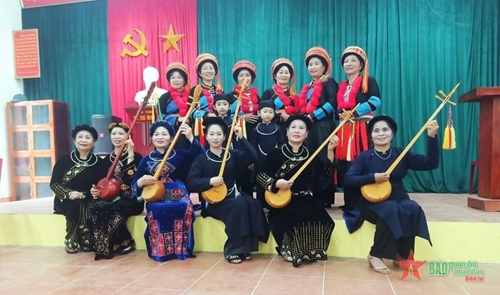The small house located in Yen Ninh commune becomes cozy with the gentle and sweet singing voice of teacher Chu Hai Hau. Every weekend, Hau and her students gather in the house to practice and hone their skills in playing Dan tinh (a traditional stringed musical instrument resembling a guitar) and singing.
    |
 |
|
Chu Thi Hai (fourth from left, front line) and her teammates play Dan tinh. |
As she was born in Cao Bang province, which is known as the cradle of Then singing, Mrs. Hau knew how to sing Then at a very young age. Since she was a little girl, her mom sang for her and taught her techniques of singing Then and playing Dan tinh.
After getting married and moving to Thai Nguyen, Hau undertook the duty as secretary of a Youth Union organization which gave her opportunities to meet and talk with children. The young woman realized that many children are fond of culture and music, and they need an instructor. Therefore, Hau decided to open the class for those who adore traditional culture.
For five years teaching Then singing for free, Hau has many times come to children’s houses to encourage and persuade them to join the class. In the context that there are innumerable games and entertainment options for young people, persuading them to learn folk music is not easy. However, thanks to her tireless efforts, the number of students in her class has continuously increased.
When teaching children to sing and play Dan tinh, she has demonstrated her enthusiasm and persistence. Thanks to the efforts, the tunes of Then singing have spread widely in every corner of villages in Phu Luong district. The class attracts not only young participants but also middle-aged aunts and uncles.
Talking about her aspiration to spread Then singing, Mrs. Hau said that cultural values will not be restored and preserved without everyone’s efforts. Then singing by the Tay, Nung, and Thai ethnic groups has been recognized as representative intangible cultural heritage of humanity by UNESCO. She said that if agencies and localities join the work, the folk music genre of ethnic minority people will be widely spread to other localities.
After five years, Hau's class is not just a free music venue, but importantly it has sown seeds of love for the cultural heritage of the nation in children’s hearts.
Translated by Tran Hoai